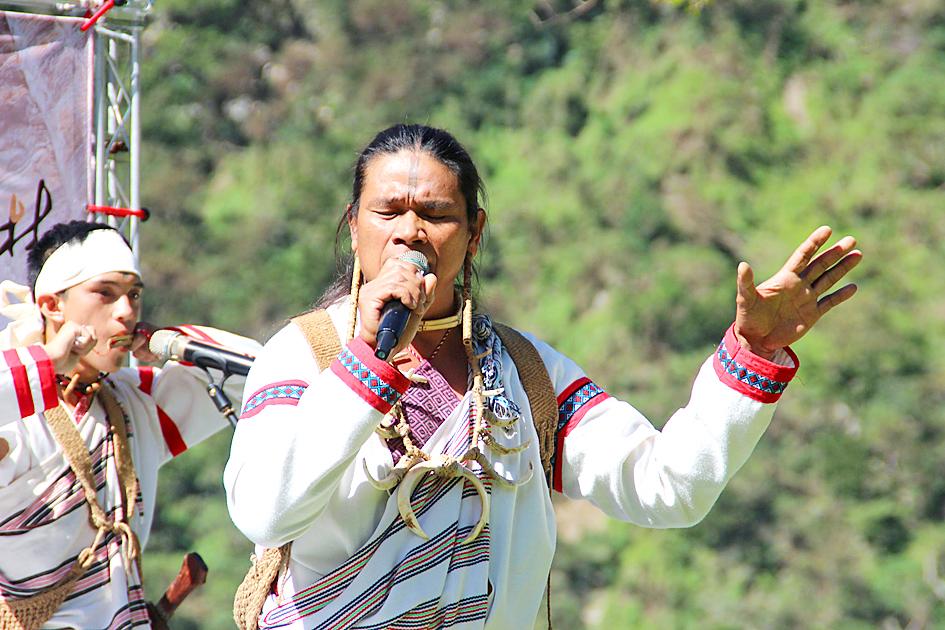Pitayro Ukah, a Truku, has spent more than a decade collecting over 200 traditional songs sung by members of his community in Hualien County, and issued two albums as part of his efforts to preserve and promote the Aboriginal culture.
Traditional Truku songs have only four notes — Re, Mi, So and La — but combinations of rhythms create different songs, Pitayro Ukah said on Sunday.
“We sing to express our thoughts, so traditional songs can be used for daily conversations,” he said. “They can be casual and spontaneous, and useful for easing tension.”

Photo: CNA
With each family having its own melodies and lyrics, Pitayro Ukah said that he grew up listening to adults use traditional songs to communicate, with the singer using volume, rhythm and singing method to express moods.
After returning to Sioulin Township’s (秀林) Jiamin Community in 2002, Pitayro Ukah said that he and his wife, Hsueh Kuo-fang (薛國芳), established a music studio named Ketusan, or “rebirth” in the Truku language, before embarking on a 15-year project to collect traditional songs.
With an audio recorder, they visited many elderly people in the community, recording not only the melodies created by their families, but also the stories behind the songs, he said.
The lyrics of traditional songs were often used by ancestors to pass down lessons or wisdom to successive generations, so the songs were rarely shared outside the family, he said, adding that several visits were sometimes needed before the elderly people opened up.
Pointing at a tattoo of Aboriginal patterns on his forehead, Pitayro Ukah said that only Truku who have undergone gaya, or “ancestral lessons,” are given the tattoo, so older members of the community are more willing to speak with him.
After collecting more than 200 traditional songs, Pitayro Ukah recorded two albums that included some of the songs, he said, adding that he was the singer, while his wife arranged the music.
The first album got into the Midem music festival — the leading international event for global music, held annually in Cannes, France — and the second album won Best Creation in the Traditional Arts and Music category at the 2015 Golden Melody Awards, Pitayro Ukah said.
In the final moments of his life, a Truku priest told Pitayro Ukah: “I have listened to these two albums over and over again, and it feels like every bit of Truku culture is in them. The music comforted and touched me.”
“Such validation brought me to tears and made me feel that everything was worth it,” Pitayro Ukah said.
As hunters share their game with community members, these collected traditional songs are to be shared with Truku and those interested in Truku culture, he added.
Pitayro Ukah also gives presentations where he shows people how to set traps for animals and shoot arrows, he said, adding that his daughter, Tumun Pitayru, has set up the KTS Cultural Heritage & Creative Space next to his studio to promote Aboriginal culture.
Tumun Pitayru creates theater productions and videos, and Pitayro Ukah said that he has been featured in musical performances — even in Europe, Australia or the US.
Asked what his next move would be, Pitayro Ukah said that a key principle in Truku culture is to live every day to the fullest.
Given that the younger generation is assisting with cultural preservation, he said that he would have more time to go through his song collection — or maybe to record the almost-lost melodies of his own family.

Taipei has once again made it to the top 100 in Oxford Economics’ Global Cities Index 2025 report, moving up five places from last year to 60. The annual index, which was published last month, evaluated 1,000 of the most populated metropolises based on five indices — economics, human capital, quality of life, environment and governance. New York maintained its top spot this year, placing first in the economics index thanks to the strength of its vibrant financial industry and economic stability. Taipei ranked 263rd in economics, 44th in human capital, 15th in quality of life, 284th for environment and 75th in governance,

The Sports Administration yesterday demanded an apology from the national table tennis association for barring 17-year-old Yeh Yi-tian (葉伊恬) from competing in the upcoming World Table Tennis (WTT) United States Smash tournament in Las Vegas this July. The sports agency said in a statement that the Chinese Taipei Table Tennis Association (CTTTA) must explain to the public why it withdrew Yeh from the WTT tournament in Las Vegas. The sports agency said it contacted the association to express its disapproval of the decision-making process after receiving a complaint from Yeh’s coach, Chuang

Control Yuan Secretary-General Lee Chun-yi (李俊俋) tendered his resignation last night, admitting that he had misused a government vehicle, as reported by media. His resignation was immediately accepted by the Control Yuan. In a statement explaining why he had resigned, Lee apologized for using a Control Yuan vehicle to transport his dog to a pet grooming salon on May 20. The issue first came to light late last month, when TVBS News reported that Lee had instructed his driver to take the dog to the salon. The news channel broadcast photos that it said were taken by an unnamed whistle-blower, which purportedly showed the

A former officer in China’s People’s Liberation Army (PLA) who witnessed the aftermath of the 1989 Tiananmen Square massacre has warned that Taiwan could face a similar fate if China attempts to unify the country by force. Li Xiaoming (李曉明), who was deployed to Beijing as a junior officer during the crackdown, said Taiwanese people should study the massacre carefully, because it offers a glimpse of what Beijing is willing to do to suppress dissent. “What happened in Tiananmen Square could happen in Taiwan too,” Li told CNA in a May 22 interview, ahead of the massacre’s 36th anniversary. “If Taiwanese students or